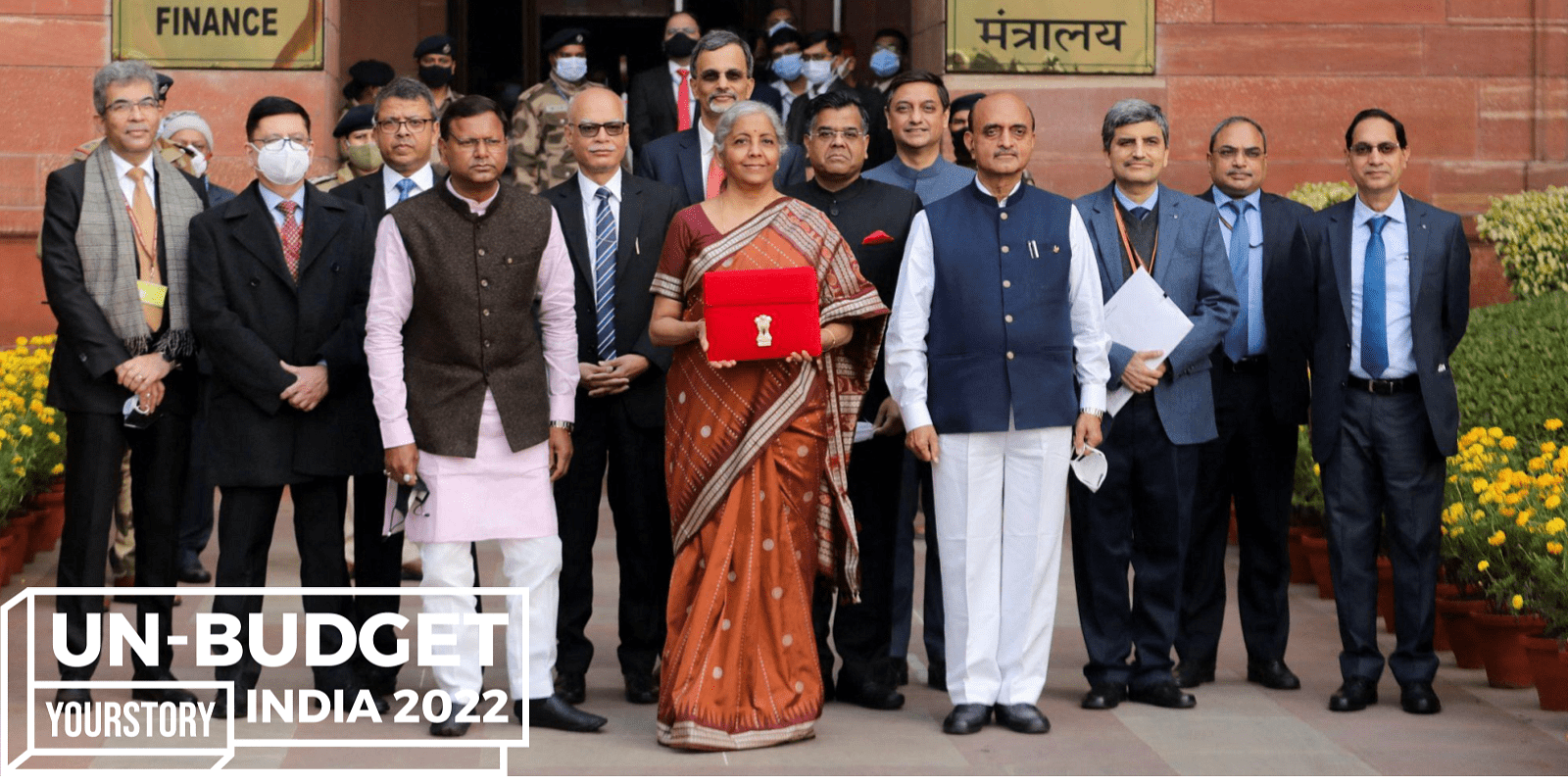Finance Minister Nirmala Sitharaman presented Union Budget 2022 on Tuesday, which touched upon all aspects of the economy — from infrastructure development, education initiatives, to instituting the National Tele-Mental Health programme.
The Budget comes at a time when the Indian economy has been on the path to recovery from the pandemic slump, with Principal Economic Advisor in the Ministry of Finance, Sanjeev Sanyal, saying the economy is now performing above pre-pandemic levels.
Focusing on the same, Budget 2022 enhanced the capex expenditure by 35 percent aimed at strengthening seamless multimodal connectivity and logistics efficiency by expanding the scope of PM Gati Shakti master plan for developing ‘holistic infrastructure’.
The Budget has also proposed measures for micro, small and medium enterprises (MSMEs), which contribute over 30 percent to the country’s GDP, to help them recover from the pandemic. Apart from this, ECLGS (Emergency Credit Line Guarantee Scheme) has been extended up to March 2023, and Rs 50,000 crore has been set aside for tourism and related sectors.
The Budget also talked about financial support for the digital payment ecosystem and promoting the use of payment platforms. FM Nirmala Sitharaman also proposed to set up 75 digital banking units in 75 districts.
Sunrise sectors like electric vehicles have been gaining steam, with around 168 percent increase in sales in 2021 as compared to the previous year, according to consulting firm EVreporter. The FM proposed a Battery Swapping Policy and said interoperability standards will be formulated.
Union Budget 2022 also announced the capping of the Long-Term Capital Gains (LTCG) taxes arising on transfer of any form of assets at 15 percent, while also introducing taxing ‘virtual digital assets’ as well as the launch of Digital Rupee.
Finance Minister Nirmala Sitharaman presenting Union Budget 2022. Source: PIB
Here’s a look at how Indian business leaders, entrepreneurs, investors, and other stakeholders across the Indian startup ecosystem and India Inc reacted to Union Budget 2022.
Ravish Naresh, CEO and Co-founder, Khatabook
The Union Budget 2022 is a well-balanced and progressive effort towards growing India’s economy, especially with regards to, startups, MSMEs, fintech, and digital infrastructure. Meeting working capital requirements during the initial years of operation is often tough for startups. Hence, tax exemption for startups being extended by one more year is a welcome move, and it is likely to further encourage innovations and growth that the startup ecosystem is delivering.
The announcement of the Emergency Credit Line Guarantee Scheme (ECLGS) extension until March 2023 is much-needed support for the MSME ecosystem’s recovery. Aiding the MSME segment’s cashflows and finances will be crucial in 2022 as it will be a year of transitioning to growth from recovery for this segment. The Budget has also shown great support towards expanding the digital Finance infrastructure in the country with the issuance of Digital Rupee and continuing the financial support for digital payments and initiatives such as setting up 75 digital banking units in 75 districts by scheduled commercial banks. Overall, Budget 2022 has successfully addressed the need of the hour by bringing in policies and reforms crucial for the growth of the country.
Subodh Garg, CFO and Growth Leader, Pickrr
We welcome the announcements of Finance Minister pertaining to logistics sector. GatiShakti Scheme will help in boosting the logistics sector. Along with the logistics sector, the Budget also has an impetus on technology and IT usage.
Akash Gehani, COO and Co-founder, Instamojo
It is heartening to see that the Union Budget 2022 focused on addressing the long-standing challenge of access to credit for MSMEs, along with enabling skilling of the MSME sector. The extension of the Emergency Credit Line Guarantee Scheme (ECLGS) comes as a relief to several MSMEs who faced testing times post the pandemic, which made them financially fragile. With better access to credit, there is hope for the revival of existing businesses, and the creation of new businesses. The ECLGS has by far provided credit for lakhs of MSMEs preventing the sector from moving into the NPA (non-performing loan) category.
Today, with digitisation defining the business landscape, digital literacy for small businesses and entrepreneurs is the need of the hour. The introduction of an integrated platform to offer skilling, access to credit, and enhanced entrepreneurial opportunities is a much-needed requirement for the sustenance and growth of the sector. This way, MSMEs can upskill to be at par with industry requirements, have free access to online resources and infrastructure, and in the long run help in the further establishment and wider reach of these businesses digitally. Additionally, the government’s plan to roll out the five-year growth program for MSMEs will further strengthen these newly rolled out initiatives.
Akash Gehani, COO and Co-founder, Instamojo
Rikant Pittie, Co-founder, EaseMyTrip
International travel has been severely impacted by the pandemic, which is why we are pleased with the introduction of e-passports with embedded chips. This will provide a big boost to travel and add a level of convenience for international travellers. Additionally, the expansion of the Emergency Credit Line Guarantee Scheme by Rs 50,000 crore to Rs 5 lakh crore will enable the small travel operators and stakeholders within the travel and tourism industry to reel back from the disruptive impact of the pandemic.
Saurabh Soni, Co-founder, Digisparsh
I welcome the government’s decision to set up 75 banking units in 75 districts. This is a strong move to penetrate digital financial services in our rural market which has 40 cr+ Jan Dhan customers. This will not just help to bring the unbanked population under the financial ecosystem, but also enable them to receive timely financial aid to fulfil their education, business and health needs. Especially post-pandemic when out of pocket expenses to meet medical emergencies have shot up drastically, forcing people to resort to unorganised debt markets consisting of loan sharks. So while more details are awaited, I hope this also paves way for PPP (Private Public Partnerships) to emerge and provide specialised, low cost, targeted financial services, because rural banking needs are starkly different from urban needs.
Ashok Patel, CEO and Founder, Max Ventilator
While the government’s announcement in the budget 2022 to accelerate the country’s general infrastructure building including connectivity and logistics through Gati Shakti would certainly catalyse the broader domestic manufacturing, it must also have positive spillover effects on the medical device segment. The continued policy support to MSMEs by way of extension of the ECLGS scheme would also be beneficial to a large number of medical device makers who fall under the MSME category. At the same time, the budget highlighting the PLI scheme, in general, should also hold value for the medical device sector. The creation of a national digital health ecosystem with a focus on mental health would also lead to enhanced business activities.
Suhail Sameer, CEO, BharatPe
We welcome the Budget announced by our Honourable Finance Minister. This budget will fuel the next level of growth of the Indian economy. The budget has re-emphasised that digital payments and fintech innovations have grown at a rapid pace in the country. The government is continuously providing thrust to ensure digital banking reaches every new nook and corner of the country and this is extremely encouraging. We strongly appreciate the government’s decision to set up 75 digital banking units in the country. This will help promote digital payments aggressively in the country and drive financial inclusion further. The introduction of RBI approved digital rupee is another landmark move- it will disrupt the Indian payment system and add a new dimension to the financial system. ‘One Nation, One Registration’ is a great initiative as it will facilitate ease of living and doing business.
BharatPe CEO Suhail Sameer
Sambit Chakraborty, Board of Adviser, Indigrid Technology
The policies should take a holistic approach to ensure that there is a proper and adequate supply network of swappable packs and swap stations so that it works as if someone is fuelling their vehicle and is able to “swap” in two to three minutes. Ground charging does not really work except at home (not for commercial purposes) because of the load it will exert on the grid and the time it takes. Convenience, especially for the last mile operators, gig economy players, and home tests/collections is key. Second, there is a proliferation of low-quality Chinese players who are “cheap”. There are substantial safety and dependency issues being built into the system. If the policy can build in a structure to raise the safety and “Aatmanirbhar” aspects and the Made in India aspects – that will be a boon for India in the long run. There are many Indian manufacturers of safe batteries and swap stations who would then not have to choose to lower quality and safety standards.
Saurabh Garg, Co-founder and CBO, NoBroker
I think one of the big focuses of this budget is affordable housing. Finance Minister has proposed to invest 48,000 crores in affordable housing which will give a big boost. Almost 80 lakhs houses would be completed this year itself. Another very interesting thing which we have seen this year in NoBroker’s real report is that water supply is one of the key reasons for choosing locality. Finance Minister coming in and proposing 60,000 crores to provide water supply to 3.8 crore houses is the right step in this direction. Also, I think creating jobs at this moment is the need of the hour with covid impacting the jobs. So, the government creating 60 lacs jobs is going to help the economy in a big way. All the sectors would benefit from that, especially these people would also drive demand for housing. We would have expected more benefits especially for the middle class and upper class for driving the demand in real estate. I think that is missing from this budget. But overall I would say it’s a budget in the right direction and it’s a positive budget.
Vikram Thaploo, CEO, Apollo Telehealth
The government in its last Union Budget had placed health and well-being as the first of its six pillars, and with India into its third year into the COVID-19 pandemic, that focus has reflected in this year’s Union Budget as well. The launch of the National Tele-Mental Health Programme, which will include a network of 23 tele-mental health centres of excellence with Nimhans being the nodal centre and IIIT Bangalore providing technology support is a welcome move by the government to augment the use of telemedicine services as well as provide support to people with mental health disorders.
Also, an open platform for the National Digital Health Ecosystem will be rolled out and it’ll further help in strengthening the healthcare services within the country. It will consist of digital registries of health providers and health facilities, unique health identity and universal access to health facilities. The increased investment towards Health Infrastructure and focus on a holistic approach to health is seen as a testimony of the commitment to building stronger health systems in the country.
Sandeep Lodha, Co-founder, Netweb Technologies
It is heartening to see the government focus on rural areas. This can accelerate the government’s earlier declared digital banks and overall enhance and enrich the rural economy. Digital banking and fintech spending by the government is going to enhance the financing and overall support the entrepreneurial spirit as well as benefit the IT sector to provide the required infrastructure. The government’s announcement of 5G spectrum auction by 22-23 was on the expected line. It is good to see the announcement of the PLI scheme for design-led manufacturing, this will help in getting ready with Make in India products and solutions. We welcome the government commitment to R&D and formalising the same by allocating 5 percent of universal service obligation to this but will need to see when this can be effective on the ground. R&D has a cycle and sooner we get in we can start rolling the products when the actual implementation starts.
Nikkhil K Masurkar, Executive Director, ENTOD Pharmaceuticals
A well-structured and a forward-looking budget encompassing all sectors and detailed steps for implementation. Healthcare and well-being has received top priority in this budget. The rollout of the National Digital Health Ecosystem that will consist of digital registries of health providers and health facilities, unique health identity and universal access to health facilities along with the National Tele-Mental Health Programme shows the government’s commitment towards improving and enhancing healthcare in India. As the future of manufacturing is driven by robotics and other automation technologies, we also appreciate the announcement of PLI schemes to create manufacturing global champions under Atmanirbhar Bharat. I am hopeful and happy about the changes in healthcare, which is an important area for India. The key is in its implementation.
Edul Patel, CEO and Co-founder, Mudrex
Finance Minister Nirmala Sitharaman has suggested 30 percent taxation on crypto gains. The losses, if any, cannot be offset against other income. Additionally, the introduction of TDS on crypto transfers can now monitor crypto transactions. On the sale of digital assets, 1 percent TDS would be applicable. Besides taxation on digital assets, India will soon have its blockchain power digital rupee. The digital asset classification will consist of crypto, NFT, and government-issued currencies. It is undoubtedly a progressive step towards boosting crypto adoption in the coming years.
Sudarshan Suchi, CEO, Save the Children India
We welcome the Honorable Finance Minister laying focus on learning outcomes and combatting learning loss by providing supplementary education for children whose education has been drastically impacted by the #pandemic. Steps like “One Class One Education TV Channel” through PM e-Vidya expanding 400 channels with a dedicated focus on regional languages for classes up to 12th can make a big difference, ensuring recovery of learning loss. It is critical that supplementary support reaches the most marginalized children who have no or limited access to technology-enabled solutions. More low-tech or no-tech solutions need to be added to reach every last child.
FM’s statement to align National Skills Qualification Framework (NSQF) with industrial need must include a focus on skilling for social development sector that includes frontline workforce such as Anganwadi workers, healthcare workers, child protection workers, and others. This will support effective service delivery to children and uphold their rights. Skill enhancement of Anganwadi workers must include and promote foundational literacy and numeracy skills to meet the mandate of NEP (National Education Policy) 2020.
The budget speech has no citation on the allocation of budget for Early Childhood Education (ECE). We hope that there is a dedicated allocation for ECE (Early Childhood Education) ranging between 1.5 percent to 2.2 percent of GDP in alignment with the need highlighted in NEP 2020.
Shiv Sehgal, President and Deputy CEO, Head of Institutional Clients Group, Edelweiss Wealth Management
Transparency, fiscal prudence and impetus to growth through capex push sum up the Budget FY23. FY22 has seen a fiscal consolidation of a whopping ~2.3 percent of GDP in just one year, clearly a remarkable achievement. For FY23, fiscal consolidation continues but at a measured pace so as to balance the needs of supporting growth with the imperative of securing financial stability. The FM has used the available fiscal space to significantly boost allocation towards capital spending, which is very welcome. This along with a continued emphasis on flagship PLI schemes and supporting the MSMEs are clearly aimed at boosting job creation in the economy. Overall, a budget that the economy needed.
Chandan Garg, Chairman and MD, Innovana Group
The extension of ECLGS scheme is a welcome move for MSMEs. The credit and fiscal support of 5 lakh crores will give a huge boost to this sector encouraging new businesses to come to the fore. This announcement will certainly generate more than 10 lakh employment opportunities in a short span of time. However, a slight focus on easing the trade and the taxation policies for MSMEs facilitating more freedom to do business was also expected from this year’s budget announcement.
Siddharth Maurya, Resource Specialist, Fund Management
The budget session has taken some prudent initiatives for MSMEs and India INC. for startups the tax concession period has been extended by one more year, which in my opinion is a very positive move. Likewise, a 15 percent tax has been decided for the newly incorporated manufacturing unit. The period of incorporation has been increased by one more year to 31-3-2024. This will further boost manufacturing activities.
Nitesh Jain, Founder and CEO, BeSingular
This is a forward-looking budget which is both inclusive and progressive. Thrust on digitalisation of education and focus on upgrading syllabus across colleges will equip upcoming human talent with the right tools. The use of high-technology such as Kisan drones as well as battery-swapping will turn out to e growth engines for both agri-based and service-based economies. The introduction of a regulated digital currency is forward-looking and is in the spirit of harnessing blockchain and other exponential technologies.
Mayank Tiwari, Founder and CEO, ReshaMandi
“The budget today was focused on tech-driven enhancement across sectors allowing for more robust growth in agriculture, MSME and manufacturing setup. The emphasis laid out on public-private partnership on tech-driven agriculture is a welcome note for most of the Agri tech startups. I am sure the budget will allow for more investments in terms of domestic investors and FDI across sectors in India to drive India@100 vision. It is also great to see the government’s continued focus on tech development, especially in the fields of Artificial Intelligence and Blockchain. It is truly the Amrit kaal for India.”
Mayank Tiwari, Founder and CEO, ReshaMandi
Dipanjan Purkayastha, CEO and Co-founder, HyperXchange
The announcement of green bonds to raise capital-focused towards carbon footprint reduction could be a significant milestone for industries that work towards sustainability. The green bonds will aid public sector projects, which in turn would support and grow ancillary private businesses that provide products and services towards this. The proposed reforms around SEZ administration and streamlining customs to only risk-based checks will significantly enhance the productivity and effectiveness of export-oriented units that manufacture and products and services exclusively for the global market.
Gurjodhpal Singh, CEO, Tide (IN)
The financial support for the digital payments ecosystem is a welcome move and further reaffirms the Government of India’s digital banking push. This push on digitisation will make way for more inclusion in the ecosystem. The focus on ‘Ease of doing business’ is a great step, as it will further promote entrepreneurship in the economy. Fintechs will continue to play the role that we have been playing for the past couple of years now, and these policies will further strengthen our role in the ecosystem. Moreover, the decision to interlink MSME portals and added corpus is the much-needed support at this hour.










![Read more about the article [Tech50] This sales engagement platform is eliminating ‘guesswork’ in sales prospecting with data-backed guided selling](https://blog.digitalsevaa.com/wp-content/uploads/2021/12/Upscalefounders-1638813896586-300x150.jpg)